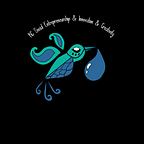Innovation Alumni Talks
Author: Barış (Grade 12)
RC Social Entrepreneurship, Innovation, and Creativity Office (RC SEIC) organized the first meeting of the series “Innovation Alumni Talks”, during which faculty, staff, and students listened to Can Yesildere’s (RC ’18) gap year experience and engaged in insightful discussions.
Why Innovation Alumni Talks?
Innovation Alumni Talks connects RC student changemakers with RC Alumni changemakers from diverse disciplines, backgrounds. This allows participants to gain exposure to diverse ideas and to challenge those very ideas in the same sharing circle.
Meeting #1: Can Yesildere RC ‘18
Can started off the discussion by talking about his gap year experience and benefits of such a practice. Then, the discussion, with Ms. Aybike Oğuz’s moderation, Head of RC Social Entrepreneurship, Innovation, and Creativity Office, emerged as a reflection of learning and teaching practices, the philosophy of individual learning, and Can’s story of self-learning during his gap year.
Why take a gap year?
Today’s status quo in economic and societal practices is based on non-stop production, which results in the loss of people’s ability to reflect on their lives. Individuals are now crushed under the burden of making “valuable” choices, and this never-ending sequence exacerbates mental health, creativity, and potential of individuals. Raison d’etre of a gap year is to step back from all of these chains and think about things. “Things” can be anything at all that helps people reflect on their lives, take a break, and just breathe without a concern of producing value.
Learning without the involvement of an institution
One of the benefits of taking a gap year is that one has full control of time without any interference of school schedule, compulsory meetings to attend, and responsibilities on a daily basis. “Oh, I have this time and I want to learn things without a class setting,” says Can and advises us to abolish traditional boundaries. There are many online classes from institutions in Africa, Asia, Europe, and more. Also, should one wish to work in a project thousands of miles away, it is absolutely possible to do that in today’s remote environment. Physical boundaries of education and jobs don’t exist anymore and there is no logic in limiting ourselves to a single classroom. When an institution is not the decision maker in one’s choices, there is no limit to the paths one can take.
Learning WITH people
Most of us feel like there is no incentive to learn without receiving grades, and this undermines our willingness to learn for the sake of learning. Making commitments in a gap year can be really difficult and is totally usual! However, Can has his own way of sustaining his learning experience: Find friends to do and learn things together, share your learning experiences with people who are there with you. For example, Can is currently taking language courses in which there are no grades. He says that a grade-free environment provides a place where everyone is able, and even encouraged to, make mistakes. Can takes those courses with a friend of his, and they keep each other motivated to continue learning.
Can, has your definition of success changed after your gap year experience?
Can thinks that, fundamentally, success in life is about feeling well. He goes on by saying that we mostly fail to recognize the smaller things that are very crucial to make the bigger parts work (for example, launching the central heating boiler in a house!). Those seemingly unimportant parts contribute very much to our wellbeing and happiness. His gap year experience has taught Can to appreciate the small things that he can really enjoy that make him comfortable.
